The account of Joseph Smith’s First Vision, found in the Joseph Smith History included at the back of any Triple Combination worth it’s salt has a wealth of information for the avid scriptorian. We can discover so much about the boy prophet, our relationship with God the Father and His son Jesus Christ, as well as the reasons Joseph Smith was asked to restore Christ’s true church on the earth. But is there a pattern hidden within this revelation that can help us with our own “first vision” today?
Before we trundle on any further, I would like to clarify what I have dubbed as our own “first vision”.
YOUR OWN FIRST VISION

The Sacred Grove
When Joseph shares with us his version of his journey of discovery in the Sacred Grove, he is essentially telling us how he developed an unwavering testimony of God’s hand in his own life. For each of us, we all must embark upon that journey ourselves if we want to create a bedrock foundation of truth to base our life on. Because, essentially, we do not choose to become active members of any type of group if we do not ascribe to its basic tenets.
And so, it only stands to reason that we would need to have our very own awakening–or, first vision.
HISTORY LESSON
I believe that if you want to understand something to its fullest, you have to understand the social and historical context in which you find it. Delving into the history of America leading up to Joseph’s encounter with deity does indeed give one food for thought.
After the revolutionary war with England, America was left with the scattered remnants of an old way of life. What Americans did know about themselves, however, was what they did not want their government to look like.
Under English rule, Church and State were united and there was a firm belief that God had put every individual in his or her place, and that struggling to overcome it was considered vulgar and socially unacceptable. In a way, this held society in a rigid social caste that had not changed much over centuries. If one wanted to be a part of the Church, you had to be born into a specific social group, and more often than not, those who joined the Church did so to provide themselves with a living, not necessarily because they had any predisposition to feel united with God. This led to a sabbath day that was not very uplifting and clergy members who were more interested in protecting their interests than in protecting their flock.
When America and England went their separate ways, a religious vacuum was left behind. No longer was there an organized state religion, nor was there any way of training members of the clergy. The playing field was leveled and many players stepped in to fill the gap.
Between the 1790s and 1830s, religious fervor (or fever) began to run high. During this time, the fastest growing religions became evangelical Methodist and Baptist. These religions preached individualism and celebrated ordinary people rather than favoring a more elitist mentality. They focused on a person’s free agency to change one’s circumstances, as well as relying on the grace of God. This was a far cry from the rigid social structure of the English empire.
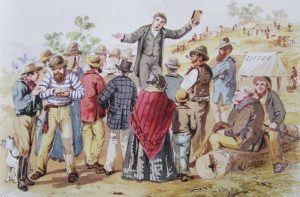
Camp meeting during the great revival era of 1830.
The fire of religious zeal caught on and soon the most popular preachers were holding huge camp revivals that boasted gatherings of up to 30,000 people. In one such case, so caught up by the emotional appeal of the preacher, 20,000 people were baptized in one go.
For those of a similar lifestyle as Joseph and his family, choosing a religion was no small thing. It is easy to understand how anyone would become confused in such an atmosphere of fiery energy and emotional investment.
LEARNING FROM A BOY PROPHET
So let’s turn back to a young boy’s own historical observation, because this is where the pattern begins.
“In the midst of this war of words and tumult of opinions, I often said to myself: What is to be done? Who of all these parties are right; or, are they all wrong together? If any one of them be right, which is it, and how shall I know it?”
(JSH 1:10)
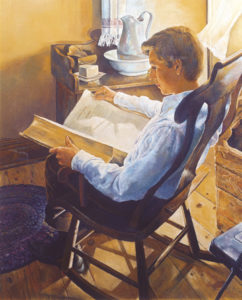
Joseph Smith
In this verse, Joseph expresses his confusion and discontentment. But, he also expresses his care. He cares enough to ask the question–”What is to be done?”. Do we care enough to ask our own questions? Do we care enough to want an answer? The first step in developing a testimony is to care.
In the very next verse, we discover the second phase.
“ While I was laboring under the extreme difficulties caused by the contests of these parties of religionists, I was one day reading the Epistle of James, first chapter and fifth verse, which reads: If any of you lack wisdom, let him ask of God, that giveth to all men liberally, and upbraideth not; and it shall be given him.”
(JSH 1:11)
Even though he was just a young boy, he “labored” with his conscience and wanted help. And so, he began to study things out in his mind. He turned to the scriptures, the main source of knowledge available to him at the time. Within these holy pages, he found some guidance–if you don’t understand something, go to someone who does–God. And when you do go, go in faith, nothing wavering.
It is the same with our day. We must study out for ourselves–do our own research before we go before the Lord.
After declaring how important this verse was to him, Joseph goes on to say that he took himself apart for quiet and contemplation.
“After I had retired to the place where I had previously designed to go, having looked around me, and finding myself alone, I kneeled down and began to offer up the desires of my heart to God.”
(JSH 1:15)
This question was of such great importance to the young boy, he chose to remove himself from all worldly distraction. I love how he says it was a place that he “had previously designed to go”. The Sacred Grove was not some random choice. It is apparent from his words that Joseph Smith thought intently about his familiar surroundings and decided upon a place that seemed to him to be the most useful for contemplation.
If we ourselves want to receive personal revelation, we too must determine to rid ourselves of all that the world provides to distract us with.
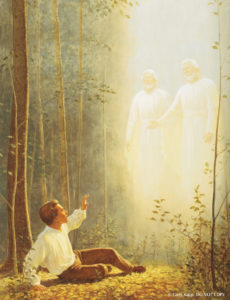
First Vision by Gary Kapp
And lastly, Joseph prayed. He opened up his heart and poured out his questions and concerns. Not only did he ask a question, he waited for an answer despite all the turmoil he felt come over him.
“finding myself alone, I kneeled down and began to offer up the desires of my heart to God. I had scarcely done so, when immediately I was seized upon by some power which entirely overcame me, and had such an astonishing influence over me as to bind my tongue so that I could not speak. Thick darkness gathered around me, and it seemed to me for a time as if I were doomed to sudden destruction.”
(JSH 1:15)
AGAIN AND AGAIN
Just like Joseph Smith, we ourselves might not get an immediate answer. We might be overcome with such feelings of depression and fear that we waver between continuing in faith or giving up. But, if we care enough and are earnest enough, we can overcome this negative influence and continue to remain faithful.
Afterall, that is just what Joseph did, and eventually, he received his answer-a most marvelous answer that changed the history…and future of mankind, as we know it!
IN THE END
Much like the boy Joseph, we too live in a time when we are beset on all sides by buffeting voices calling for our attention and care. Whether they be social, emotional, political, or cultural, the distractions are very real and can be confusing.
Which is the right voice?
What path should I choose?
Who can I trust?
Why should I do this?

To read more articles by Jessica, click here.
The key to continuing on the right path is to begin like Joseph Smith did–to care. To care enough to ask a question. To care enough to study and research your dilemma. To care enough to to remove yourself from the cares and distractions of the world as you search. And finally, to care enough to take your decision to the a loving Heavenly Father; always remembering, however, that sometimes the process might need to be repeated again and again.
By staying close to the Spirit your questions can and will be answered, and you too will be entitled to your very own first vision–one that will set a foundation of belief for the rest of your life.
About Jessica Clark
Jessica Clark is a wife, mom, writer, runner, knitter, and proud Canadian. She graduated from Brigham Young University with a degree in Anthropology, and has been a student of people and cultures ever since. Right now she is busy studying the behavior and cultures of the people of Texas.
Twitter •


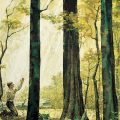

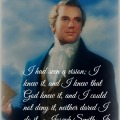


Jessica,
I miss your articles! It gives me great insight into your thoughts and besides, I love your writing!
Alma